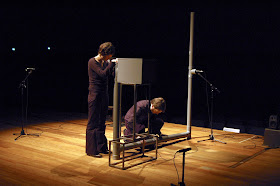The subject concerned “composed performers” and
applied the perspective of the composer to investigate the body in musical
performance. The remarkably well-written dissertation (download here - buy the English publication here) looks at this topic
from a thoroughly thought-out set of angles, including the body of the composer
himself, the relation between performing bodies and instruments, technology and
space (physically sounding and mentally perceived) and embodiment of silence as
well as non-linearity. More than showing how his insights influenced his
compositional practice, the dissertation gives a very detailed and
in-depth account of the status of this subject in recent history. The relation
with his own, extremely creative work was revealed in the concert and lecture
that preceded the day of the promotion.
Wednesday, March 30, 2011
Dr. Paul Craenen
Yesterday afternoon, at
4.15pm, Leiden University and docARTES saw Flemish composer Paul Craenen defend his research to become
Doctor in the Arts.
The value of the research
goes beyond showing how Dr. Craenen thinks about the bodies for which he
composes music. Besides working out a complete set of concepts to frame his
line of thought (including new meaning given to Lachenmann’s “musique concrète
instrumentale”), this research is important as it details the reflections of an
artistic practitioner on the trendy topic of embodiment. All too often, issues
of embodiment are considered from a neutralizing distance that renders the
research outcome theoretical rather than effective. Amongst other, his approach
shows - once more but with compellingly novel evidence - why performances must
be experienced live and visually. More to the point of artistic research yet,
some of the conclusions indicate precisely how the old dichotomy between
reproductive performers and innovative composers is out of date when compared
to the musical potential that the bodily parameter, well… embodies.



and the prize for the first comment on this blog goes to Godfried!
ReplyDelete